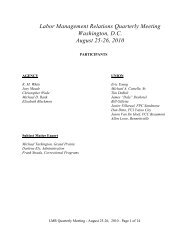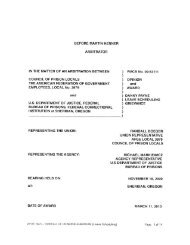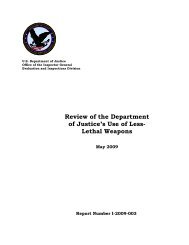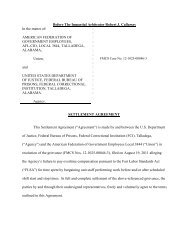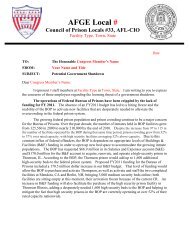Jacqueline D. Carson, Complainant, v. Eric H. Holder, Jr., Attorney ...
Jacqueline D. Carson, Complainant, v. Eric H. Holder, Jr., Attorney ...
Jacqueline D. Carson, Complainant, v. Eric H. Holder, Jr., Attorney ...
You also want an ePaper? Increase the reach of your titles
YUMPU automatically turns print PDFs into web optimized ePapers that Google loves.
<strong>Jacqueline</strong> D. <strong>Carson</strong>, <strong>Complainant</strong>, v. <strong>Eric</strong> H. <strong>Holder</strong>, <strong>Jr</strong>., <strong>Attorney</strong> General, Department of Justice(Federal Bureau of Prisons), AgencyEqual Employment Opportunity Commission-OFOAppeal No. 0120100078Agency No. P20050167February 16, 2012Related Index Numbers18.0629 Promotion, Reprisal23.045 Reasonable Accommodation, Types of31.0975 Sexual Harassment, Non-Sexual Harassment4.0181 Investigation, Supplemental43.0612 Personnel Actions, Corrective, PromotionRulingThe Department of Justice subjected an officer to retaliation when it did not select her for a promotion anda hostile work environment.MeaningOnce the EEO complaint process is initiated, an agency is required to retain related personnel recordsuntil a final disposition of the complaint.Case SummaryA correctional officer for the Federal Bureau of Prisons alleged that the agency subjected her todiscrimination based on sex (female), disability (post-traumatic stress disorder), and reprisal. The EEOCfound the agency subjected her to retaliation and a hostile work environment. The EEOC found it morelikely than not that the agency's reasons for not selecting her for a promotion were a pretext to retaliateagainst her for filing a prior EEO complaint. The agency acknowledged that the warden was aware of herprior EEO activity, despite his testimony to the contrary. The officer said that she heard the wardenspecifically mention EEO complaints as a factor that could decrease one's promotion potential. Acoworker also heard the warden's statement. The EEOC pointed out that the agency's investigator did notquestion the warden about the comments. The EEOC was not persuaded by management's negativeassessment of the officer's performance because she received all "exceeds" and "outstanding" ratings.The EEOC also said that the agency failed to provide the votes or vouchering record for the selection.Since the agency failed to comply with requirements to retain its personnel records, the EEOC took anadverse inference against the agency and found that if the missing records were preserved, they wouldhave shown that the agency's explanations for the non-selection were not credible.The EEOC also found that the officer was subjected to a hostile work environment. She said a coworkerfailed to respond to her distress call, ignored her at the equipment desk, and failed to open a locked door,leaving her trapped. The agency's investigator failed to ask the coworker about the incidents. The officeralso continued to receive emails about an event she did not want to attend. The EEOC said the conductwas offensive and interfered with her work performance. Also, the coworker's failure to respond to herdistress call was physically threatening. The EEOC found the agency failed to establish that it conductedan appropriate investigation that would stop and remedy the harassment.
The EEOC did not find support for the officer's contention that she requested a reasonableaccommodation. The EEOC also found no support for her claim that she was not selected for anotherposition based on her prior EEO activity or sex.The agency was ordered to promote the officer, pay back pay, and conduct a supplemental investigationon compensatory damages.Full TextDecisionBackgroundContentions on AppealAnalysis and FindingsSenior Correctional Officer PromotionHarassmentNot Selected for Recreation Sports Specialist Position/Failure to AccommodateConclusionOrder (D0610)Implementation of the Commission's Decision (K0610)Statement of Rights -- On Appeal Reconsideration (M0610)<strong>Complainant</strong>'s Right to File a Civil Action (T0610)Right to Request Counsel (Z0610)DecisionOn September 29, 2009, <strong>Complainant</strong> filed an appeal from the Agency's August 28, 2009, final decisionconcerning her equal employment opportunity (EEO) complaint alleging employment discrimination inviolation of Title VII of the Civil Rights Act of 1964 (Title VII), as amended, 42 U.S.C. § 2000e et seq.; andSection 501 of the Rehabilitation Act of 1973 (Rehabilitation Act), as amended, 29 U.S.C. § 791 et seq.The Commission deems the appeal timely and accepts it pursuant to 29 C.F.R. § 1614.405(a). For thefollowing reasons, the Commission AFFIRMS in part and REVERSES in part the Agency's final decision.The agency is directed to comply with the ORDER below.BackgroundAt the time of events giving rise to this complaint, <strong>Complainant</strong> worked as a GS-7 Senior CorrectionalOffice at the Agency's Federal Correctional Complex in Coleman, Florida. <strong>Complainant</strong> worked at theColeman facility for ten years. The Coleman complex has five facilities including a low security facility, amedium security facility, and a penitentiary. During relevant period, <strong>Complainant</strong> worked at thepenitentiary. On or about May 26, 2007, <strong>Complainant</strong> was separated from employment due to herdisability retirement.The record reveals that in April 2004, <strong>Complainant</strong> filed a prior EEO complaint against a CorrectionalOfficer 1 (CO1). In the complaint, <strong>Complainant</strong> alleged that CO1 locked her in a tower, forced her to cleantoilets, and would not allow her to leave until she finished. <strong>Complainant</strong> averred that the tower incidentbrought back difficult memories of physical, sexual and emotional abuse she suffered at the hands of herfather. After the tower incident, she resumed counseling for Post Traumatic Stress Disorder (PTSD). 1In January 2005, <strong>Complainant</strong> applied for, and was found qualified for the Senior Correctional Officerposition. On March 2, 2005, the Warden announced the selectees for the position at an Annual RefresherTraining course. <strong>Complainant</strong> was not selected. <strong>Complainant</strong> contacted an EEO Counselor and initiatedthis complaint alleging that at the meeting, the Warden announced that:
"people who file EEO complaints and people who do not have good rapport with Lieutenants, who calledin sick all the time probably would not have been selected .... Those people that filed EEO complaintsdon't get promoted and them (sic) file EEO complaints on the selection."<strong>Complainant</strong> contended that she received "exceeds" or "outstanding" ratings on her recent performanceappraisals, had more seniority, and was more qualified than others selected. One of <strong>Complainant</strong>'s coworkersat the training stated that the Warden informed him that selections were based on the number oflieutenants you had in your back pocket, and that he "had to grease the wheel." The co-worker filed aunion grievance, and an additional four more officers were promoted. The Warden retired on May 2,2005.The Warden explained to the EEO Counselor that he made the selections based on the input ofLieutenants. He selected the officers off the best qualified list who received the most votes. The Wardenstated that <strong>Complainant</strong> did not receive any recommendations from her Lieutenants. Although theAgency's Investigator requested the Agency provide voucher sheets containing the "votes," none weresupplied.The Warden averred that <strong>Complainant</strong> was an "average" to "below average" Correctional Officer, and thatshe had taken a lot of sick leave. The Agency's investigator did not ask the Warden if he made thestatement about how filing EEO complaints would hurt one's chances at promotion. The Warden deniedknowledge of <strong>Complainant</strong>'s prior EEO complaint.Other testimony about <strong>Complainant</strong>'s performance included statements from the Associate Warden whoaverred that <strong>Complainant</strong> was "opportunistic." Further, he stated that that she was not a "star employee."<strong>Complainant</strong> alleged that she was harassed following the filing of her EEO complaint. In April 2005, shestated that she received e-mails about an upcoming program called "Jail and Bail," where CorrectionalOfficers would be "hand-cuffed, made to cry, taunted, teased and made to clean like orderlies."<strong>Complainant</strong> informed the Associate Warden and he told her to take sick leave. <strong>Complainant</strong> also allegedthat a Lieutenant referred to her as "Rapunzel." <strong>Complainant</strong> alleged that as part of the harassment, CO1ignored a distress call that <strong>Complainant</strong> made when a female visitor to the facility began screaming,crying and waving her hands in an assaultive posture.In February 2005, she applied for a GS-9 Recreation Sports Specialist position so that she could getaway from the environment. She alleged that she informed the Human Resource Specialist that she wasbeing harassed at the facility, and that she requested to be placed into the position only at the Lowsecurity facility. <strong>Complainant</strong> averred that she asked for a reasonable accommodation. In response, theHuman Resources Specialist stated that she did not recall such a request, although she averred that shestapled a note to <strong>Complainant</strong>'s application indicating that <strong>Complainant</strong> only wanted to be considered forthe position if it was at the Low facility.<strong>Complainant</strong> was found qualified for the Recreation position, but was not selected. The three others foundqualified were selected at the GS-5 and GS-07 levels. Although <strong>Complainant</strong> maintains she was morequalified than the others, the agency stated she was not the most qualified and that she was not chosenbecause she had restricted her application to only the Low facility. The agency's Human ResourcesManager averred that employees must be able to work at all facilities in the complex.On April 20, 2005, <strong>Complainant</strong> submitted a request for workmen's compensation to the Safety Manager.<strong>Complainant</strong> also provided a note from her psychiatrist which stated that she was suffering from PTSDand that she <strong>Complainant</strong>'s prognosis was "good with continued mental health counseling [and that]appropriate corrective and remedial responses by her employer would also be beneficial in reducing herrecently exacerbated symptoms of chronic PTSD." <strong>Complainant</strong> was referred to EAP, and the SafetyManager referred the matter to the Manager of Human Resources.
<strong>Complainant</strong> also alleged that in May 2005, CO1 made her wait 10 minutes when she requestedequipment in the Control room, and further alleged that CO1 made her wait fifteen minutes beforeopening the Special Housing Unit sally ports, so that she could not move between the locked grilles. Thisincident caused <strong>Complainant</strong> stress so she took sick leave for the remainder of the day. <strong>Complainant</strong>states that she reported the harassment, and stated that she was "terrified of this Officer and ... scaredthat he will do something to endanger me at work." The next day, on May 18, 2005, <strong>Complainant</strong> wasinformed she could not return to work until her physician stated that she could perform the job. Theagency then issued her a fitness for duty letter, which requested her prognosis and diagnosis.The psychiatrist noted that "[<strong>Complainant</strong>] should not return to her current work setting due to apparentlyongoing workplace sexual harassment and retaliatory actions against her by her current employer."<strong>Complainant</strong> did not return to work and ultimately retired on full disability in May 26, 2007.On April 5, 2005, <strong>Complainant</strong> filed an EEO complaint alleging that the Agency discriminated against heron the bases of sex (female), disability (PTSD and of reprisal for prior protected EEO activity under TitleVII of the Civil Rights Act of 1964 when:1. in March 2005, she was not selected for a GS-8 Senior Correctional Officer position;2. she was subjected to harassment when the following occurred:a. in April 2005, she was forced to use sick leave so she would not have to attend "jail and bail"b. on May 17, 2005, she was locked in the sally port;3. on May 9, 2005, she was not selected for the Recreation Specialist position and4. she was denied a reasonable accommodation when, on May 18, 2005, she was told she could notreturn to work until she underwent a fitness for duty examination (FFD).At the conclusion of the investigation, the Agency provided <strong>Complainant</strong> with a copy of the report ofinvestigation and notice of her right to request a hearing before an EEOC Administrative Judge (AJ).When <strong>Complainant</strong> did not request a hearing within the time frame provided in 29 C.F.R. § 1614.108(f),the Agency issued a final decision pursuant to 29 C.F.R. § 1614.110(b).In its decision, the Agency found the Warden was not truthful when he denied that he was aware of<strong>Complainant</strong>'s prior EEO complaint, as the record from <strong>Complainant</strong>'s prior complaint revealed evidenceto the contrary. The Agency questioned the Warden's testimony that he relied on the vouchers becausethey were not in the record, so the votes could not be verified. The Agency found sufficient evidenceestablishing that the Warden made comments at the Refresher Training Course that indicated heconsidered non-merit based criteria when making his selections. However, the Agency did not agree with<strong>Complainant</strong>'s claim that he based his decisions on <strong>Complainant</strong>'s prior EEO activity. Rather, the Agencydetermined there was sufficient evidence supporting its claim that <strong>Complainant</strong> was not selected becauseher performance was not above average. It found that <strong>Complainant</strong> failed to provide sufficient evidenceestablishing, more likely than not, that the agency's reasons for not selecting <strong>Complainant</strong> were a pretextfor discrimination or retaliation.With respect to the nonselection for the Recreation Sports Specialist position, the Selecting Officialaverred he was unaware that <strong>Complainant</strong> filed an earlier EEO complaint, and unaware that she sufferedfrom PTSD. The agency found it can choose among equally qualified candidates, as long asdiscrimination was not involved. The agency noted that although one of the candidates (female) hadminimal recreation experience, there was no evidence that she was chosen because of a discriminatoryor retaliatory motive.
As for her Failure to Accommodate claim, the agency assumed, without deciding, that <strong>Complainant</strong>'sPTSD constituted a disability under our Regulations. The Agency noted that <strong>Complainant</strong> did not indicateon her application that she was seeking the Recreation Sports Specialist position as an accommodation.Further, the April 20, 2005 documentation from her psychiatrist did not make any request foraccommodation or specific recommendations. Indeed, the agency found the only evidence ofconversations about a request for reasonable accommodation happened in mid to late May 2005, afterthe position had already been awarded to others. By that time, however, <strong>Complainant</strong>'s psychiatrist haddocumented that <strong>Complainant</strong> was unable to work at the facility at all.The Agency did not examine <strong>Complainant</strong>'s claim of harassment.The decision concluded that <strong>Complainant</strong> failed to prove that the Agency subjected her to discriminationas alleged.Contentions on AppealOn appeal, <strong>Complainant</strong> contends that the agency failed to accommodate her disability. She contendsthat the agency's shifting reason for her nonselection for the Recreation Sports Specialist position isevidence of pretext. Further, she states that the agency conducted an inadequate investigation, and failedto interview certain witnesses. She provided statements from other employees who witnessed theWarden's comments at the Refresher Training Course.The agency did not respond to <strong>Complainant</strong>'s appeal.Analysis and FindingsAs this is an appeal from a decision issued without a hearing, pursuant to 29 C.F.R. § 1614.110(b), theAgency's decision is subject to de novo review by the Commission. 29 C.F.R. § 1614.405(a). See EqualEmployment Opportunity Management Directive for 29 C.F.R. Part 1614, at Chapter 9, § VI.A. (November9, 1999) (explaining that the de novo standard of review "requires that the Commission examine therecord without regard to the factual and legal determinations of the previous decision maker," and thatEEOC "review the documents, statements, and testimony of record, including any timely and relevantsubmissions of the parties, and ... issue its decision based on the Commission's own assessment of therecord and its interpretation of the law").Senior Correctional Officer Promotion<strong>Complainant</strong> can establish a prima facie case of reprisal discrimination by presenting facts that, ifunexplained, reasonably give rise to an inference of discrimination. Shapiro v. Soc. Sec. Admin., EEOCRequest No. 05960403 (Dec. 6, 1996) (citing McDonnell Douglas Corp. v. Green, 411 U.S. 792, 802(1973)). Specifically, in a reprisal claim, and in accordance with the burdens set forth in McDonnellDouglas, Hochstadt v. Worcester Foundation for Experimental Biology, 425 F. Supp. 318, 324 (D. Mass.),aff'd, 545 F.2d 222 (1st Cir. 1976), and Coffman v. Dep't of Veteran Affairs, EEOC Request No. 05960473(Nov. 20, 1997), a complainant may establish a prima facie case of reprisal by showing that: (1) he or sheengaged in a protected activity; (2) the agency was aware of the protected activity; (3) subsequently, heor she was subjected to adverse treatment by the agency; and (4) a nexus exists between the protectedactivity and the adverse treatment. Whitmire v. Dep't of the Air Force, EEOC Appeal No. 01A00340 (Sept.25, 2000).To prevail in a disparate treatment claim such as this, <strong>Complainant</strong> must satisfy the three-part evidentiaryscheme fashioned by the Supreme Court in McDonnell Douglas Corp. v. Green, 411 U.S. 792 (1973).<strong>Complainant</strong> must initially establish a prima facie case by demonstrating that he or she was subjected toan adverse employment action under circumstances that would support an inference of discrimination.Furnco Constr. Co. v. Waters, 438 U.S. 567, 576 (1978). Proof of a prima facie case will vary depending
on the facts of the particular case. McDonnell Douglas, 411 U.S. at 804 n. 14. The burden then shifts tothe Agency to articulate a legitimate, nondiscriminatory reason for its actions. Tex. Dept of Cmty. Affairs v.Burdine, 450 U.S. 248, 253 (1981). To ultimately prevail, <strong>Complainant</strong> must prove, by a preponderance ofthe evidence, that the Agency's explanation is pretextual. Reeves v. Sanderson Plumbing, Products, Inc.,530 U.S. 133, 120 S.Ct. 2097 (2000); St. Mary's Honor Ctr. v. Hicks, 509 U.S. 502, 519 (1993).After a review of the record, we find <strong>Complainant</strong> established, more likely than not, that the agency'sreasons for not selecting her to the Senior Correctional Officer position were a pretext to retaliate againsther for filing a prior EEO complaint. The record reveals that <strong>Complainant</strong> filed a sexual harassmentcomplaint when CO1 locked her in a tower and forced her to clean toilets. Moreover, the Agencyacknowledged that the Warden was aware of <strong>Complainant</strong>'s prior EEO activity, despite his testimony tothe contrary.<strong>Complainant</strong> averred that she heard the Warden specifically mention EEO complaints as a factor whichwould hamper one's promotion potential at the Refresher Training Course. She provided further testimonythat supports her contention that the Warden did not want to select people for the position who had filedEEO complaints. Specifically, on appeal, a co-worker recounts that the during the announcement, theWarden stated, "officers who don't have more than one lieutenant in their hip pocket will not getpromoted; officers who filed complaints on their supervisors or who call in sick shouldn't expect to bepromoted ..." Indeed, none of the individuals who were selected for the promotion had prior EEO activity.Notably, the Agency's Investigator never even questioned the Warden as to whether he made thecomments about EEO activity.We are also not persuaded by management's negative assessment of <strong>Complainant</strong>'s performance.<strong>Complainant</strong>'s most recent performance appraisal was comparable in all respects with the selectees'performance appraisals, as she received all "exceeds" and "outstanding" ratings. Indeed, her ratingofficial noted, "[<strong>Complainant</strong>] has had an excellent year, and with her work habits and attitude the sky isthe limit. Keep up the GOOD work." This documentary evidence is in direct conflict with the Warden, whothe agency has already acknowledged has a credibility problem.Although the Warden reported that he relied on the votes from Lieutenants, we cannot verify this becauseof the agency's failure to provide the votes or vouchering record. No explanation was provided, yet itappears vouchers were critical to the selections process. We note that EEOC Regulation 29 C.F.R. §1602.14 provides that agencies must preserve any records pertaining to selections and promotions for aperiod of one year from the date of the making of the record or the personnel action, whichever comeslater. The regulation also requires that once the complaint process is initiated, the agency is required toretain personnel records until a final disposition of the complaint. Because the agency has failed tocomply with 29 C.F.R. § 1602.14, we take an adverse inference against the agency and find that had themissing records been preserved, they would have shown that the agency's explanations for whycomplainant was not selected for the position were not credible. See Cosentine v. Department ofHomeland Security, EEOC Appeal No. 07A40114 (August 9, 2006) (citing Hale v. Department of Justice,EEOC Appeal No. 01A03341 (December 8, 2000)).Accordingly, we find <strong>Complainant</strong> has established that the Warden was aware of complainant's prior EEOactivity, and that he harbored a retaliatory animus against those who engaged in EEO activity.<strong>Complainant</strong> has established that the agency's reasons for its actions were not truthful, but were a pretextto retaliate against her for having filed an EEO complaint. In order to remedy this matter, the agency isdirected to comply with the order below.HarassmentTo establish a claim of harassment a complainant must show that: (1) they belong to a statutorilyprotected class; (2) they were subjected to harassment in the form of unwelcome verbal or physicalconduct involving the protected class; (3) the harassment complained of was based on their statutorily
protected class; (4) the harassment affected a term or condition of employment and/or had the purpose oreffect of unreasonably interfering with the work environment and/or creating an intimidating, hostile, oroffensive work environment; and (5) there is a basis for imputing liability to the employer. See Henson v.City of Dundee, 682 F.2d 897 (11th Cir. 1982). Further, the incidents must have been "sufficiently severeor pervasive to alter the conditions of [complainant's] employment and create an abusive workingenvironment." Harris v. Forklift Systems, Inc., 510 U.S. 17, 21 (1993). The harasser's conduct should beevaluated from the objective viewpoint of a reasonable person in the victim's circumstances. EEOCEnforcement Guidance on Harris v. Forklift Systems Inc., EEOC Notice No. 915.002, at 2 (Mar. 8, 1994).In determining whether an environment is "hostile" or "abusive," a trier of fact must consider all thecircumstances, including the following: the frequency of the discriminatory conduct; its severity; whether itis physically threatening or humiliating, or a mere offensive utterance; and whether it unreasonablyinterferes with an employee's work performance. Harris, 510 U.S. at 23.After a review of the entire record, we find <strong>Complainant</strong> proved she also was subjected to a hostile workenvironment. <strong>Complainant</strong> contends that CO1 failed to respond to her distress call, ignored her at theequipment desk, and failed to open a locked door, which trapped her. The agency's investigator failed toask CO1 about any of these incidents. One co-worker corroborated <strong>Complainant</strong>'s claim that she wasmade to wait an unreasonable amount of time to get her equipment.The facility's new Warden averred that once <strong>Complainant</strong> complained to management about theseincidents, an investigation was conducted and the allegations were not sustained. Management averredthat an investigation revealed that a Lieutenant did in fact respond to the duress call, and that<strong>Complainant</strong> was required to remain at the door for only a few extra minutes. However, there are nodocuments supporting this testimony in the record from the investigation into <strong>Complainant</strong>'s claims. Thereis no testimony from any witnesses to these events. One individual averred that it was another co-worker(CO2), not CO1, who was responsible for the failure to open the locked door, but there is no testimonyfrom that CO2, who was a witness to the event.<strong>Complainant</strong> also alleges she was harassed when she received emails about the "Jail and Bail" eventwhich was part of Correction Officer's Week. During "Jail and Bail," e-mails announcing this event statedthat staff would be "hand-cuffed, made to cry, taunted, teased and made to clean like orderlies."<strong>Complainant</strong> informed the Warden that she did not wish to participate, and the agency informed her shecould take sick leave on that day. However, <strong>Complainant</strong> continued to receive e-mails about the event.<strong>Complainant</strong> stated that a Lieutenant threatened her: "you chose to take your complaint outside thehouse, now you have to suffer the consequences.'' This testimony was unrebutted, as the Agency neversecured an affidavit from the individual who made the remark.In light of the allegations, and the agency's failure to secure relevant affidavits and documents, we findthe evidence in the record supports <strong>Complainant</strong>'s version of the events. An agency is responsible foracts of harassment in the workplace by complainant's co-workers where the agency knew (or should haveknown) of the conduct and failed to take immediate and appropriate corrective action. EnforcementGuidance: Vicarious Liability for Unlawful Harassment by Supervisors EEOC Notice No. 915.002 (June18, 1999); see Policy Guidance on Current Issues of Sexual Harassment (March 19, 1990); Villanueva v.Department of Homeland Security, EEOC Appeal No. 01A34968 (August 10, 2006). In light of theagency's failure to provide any credible testimony or documentation supporting its position that itinvestigated the matter, we find the agency failed to establish that it conducted an appropriateinvestigation that would stop and remedy the harassment.After a review of the record, we find <strong>Complainant</strong> established, more likely than not, that these incidentsoccurred as she alleged, and that they rose to the level of a hostile work environment. The conduct wasoffensive and interfered with <strong>Complainant</strong>'s work performance. The failure to respond to <strong>Complainant</strong>'sduress call was physically threatening. The agency failed to establish that it took prompt remedial actionto stop and remedy the harassment. Therefore, in order to remedy the harassment, the agency is directedto comply with the order below.
Not Selected for Recreation Sports Specialist Position/Failure to AccommodateThe Rehabilitation Act prohibits discrimination against qualified disabled individuals. See 29 C.F.R. §1630. In order to establish that <strong>Complainant</strong> was denied a reasonable accommodation, <strong>Complainant</strong> mustshow that: (1) she is an individual with a disability, as defined by 29 C.F.R. 1630.2(g); (2) she is aqualified individual with a disability pursuant to 29 C.F.R. § 1630.2(m); and (3) the Agency failed toprovide a reasonable accommodation. See Enforcement Guidance. Reasonable Accommodation andUndue Hardship under the Americans with Disabilities Act, EEOC No. 915.002 (Oct. 17, 2002)("Enforcement Guidance"). Under the Commission's regulations, an Agency is required to makereasonable accommodation to the known physical and mental limitations of a qualified individual with adisability unless the Agency can show that accommodation would cause an undue hardship. See 29C.F.R. §§ 1630.2(o) and (p).<strong>Complainant</strong> contends that she spoke with the Human Resources Specialist and informed her that shewas being harassed, and requested that she be placed only at the Low Facility as Recreation SportSpecialist. After a review of the record and assuming <strong>Complainant</strong> is an individual with a disability, we donot find sufficient support for <strong>Complainant</strong>'s contention that she requested a reasonable accommodationfor her disability. The Human Resources Specialist averred she does not recall the conversation about<strong>Complainant</strong> being harassed, but does admit that <strong>Complainant</strong> requested to work only at the Low facility.However, we do not find sufficient evidence that supports <strong>Complainant</strong>'s claim that she requested anaccommodation for her disability during that meeting. Nothing in <strong>Complainant</strong>'s note from her psychiatristrequests an accommodation either; it only vaguely refers to "corrective and remedial responses from heremployer."Moreover, we find that by May 18, 2005, <strong>Complainant</strong> was no longer a qualified individual with adisability. <strong>Complainant</strong>'s psychiatrist noted that by this time <strong>Complainant</strong> could no longer work in thefacility. The new Warden testified that during a subsequent conversation, he asked <strong>Complainant</strong> if shecould come back to work, and he avers that <strong>Complainant</strong> did not respond affirmatively. (SupplementalReport of Investigation at Exhibit 7). Even when she was questioned by the Agency Investigator as towhether she could come back and work, <strong>Complainant</strong> did not confirm that she was able to work at thefacility, or any other facility.Finally, we find no support for <strong>Complainant</strong>'s claim that she was not selected for the Recreation SportSpecialist position due to her prior EEO activity or her sex. <strong>Complainant</strong> failed to present any evidencewhich would support an inference of discrimination.ConclusionBased on a thorough review of the record and the contentions on appeal, including those not specificallyaddressed herein, we REVERSE the agency's final action in part, and AFFIRM the agency's final action inpart. The agency is directed to comply with the ORDER below:Order (D0610)The Agency is ordered to take the following remedial action:1. Within thirty (30) days from the date this decision becomes final, the agency shall offer <strong>Complainant</strong>promotion to the GS-8 Senior Correctional Officer position, or a substantially equivalent position,retroactive to the March 2, 2005, the date of the selection. The offer shall be made in writing. <strong>Complainant</strong>shall have 15 days from receipt of the offer to accept or decline the offer. Failure to accept the offer with15 days will be considered a declination of the offer unless complainant can show that circumstancesbeyond her control prevented a response within the time limit.
2. The Agency shall determine the appropriate amount of back pay, with interest, and other benefits(salary increases, seniority, retirement benefits, etc.) due <strong>Complainant</strong>, from March 2, 2005 until May 26,2007, (the date of her retirement), pursuant to 29 C.F.R. § 1614.501, no later than sixty (60) calendardays after the date this decision becomes final. The <strong>Complainant</strong> shall cooperate in the Agency's effortsto compute the amount of back pay and benefits due, and shall provide all relevant information requestedby the Agency. If there is a dispute regarding the exact amount of back pay and/or benefits, the Agencyshall issue a check to the <strong>Complainant</strong> for the undisputed amount within sixty (60) calendar days of thedate the Agency determines the amount it believes to be due. The <strong>Complainant</strong> may petition forenforcement or clarification of the amount in dispute. The petition for clarification or enforcement must befiled with the Compliance Officer, at the address referenced in the statement entitled "Implementation ofthe Commission's Decision."3. Within 60 days of the date this decision becomes final, the Agency shall conduct an expeditedsupplemental investigation to determine whether <strong>Complainant</strong> is entitled to compensatory damagesincurred as a result of the Agency's discriminatory action. The Agency shall allow <strong>Complainant</strong> to presentevidence in support of her compensatory damages claim. See Carle v. Dept of the Navy, EEOC AppealNo. 01922369 (Jan. 5, 1993). <strong>Complainant</strong> shall cooperate with the Agency in this regard. The Agencyshall issue a final decision addressing the issues of compensatory damages no later than 60 days afterthe Agency's receipt of all information. The Agency shall submit a copy of the final decision to theCompliance Officer at the address set forth herein;4. The agency shall post a notice in accordance with the paragraph below;5. The agency shall pay attorney's fees in accordance with the paragraph below;6. The agency shall provide a minimum of sixteen (16) hours of training to the Warden, supervisors, andall other personnel who direct the work of others at the facility in the laws prohibiting employmentdiscrimination, paying particular attention to retaliation and harassment.7. Within sixty (60) calendar days after the date this decision becomes final, the Agency shall considertaking appropriate disciplinary action against the responsible officials, including the Warden, CO1, andthe other co-workers responsible for the harassment. The Commission does not consider training to bedisciplinary action. The Agency shall report its decision to the compliance officer. If the Agency decides totake disciplinary action, it shall identify the action taken. If the Agency decides not to take disciplinaryaction, it shall set forth the reason for its decision not to impose discipline. If the responsible managementofficials have left the Agency's employment, the Agency shall furnish documentation of their departuredates.8. The Agency is further directed to submit a report of compliance, as provided in the statement entitled"Implementation of the Commission's Decision." The report shall include supporting documentation of theAgency's calculation of backpay and other benefits due <strong>Complainant</strong>, including evidence that thecorrective action has been implemented.Implementation of the Commission's Decision (K0610)Compliance with the Commission's corrective action is mandatory. The Agency shall submit itscompliance report within thirty (30) calendar days of the completion of all ordered corrective action. Thereport shall be submitted to the Compliance Officer, Office of Federal Operations, Equal EmploymentOpportunity Commission, P.O. Box 77960, Washington, DC 20013. The Agency's report must containsupporting documentation, and the Agency must send a copy of all submissions to the <strong>Complainant</strong>. If theAgency does not comply with the Commission's order, the <strong>Complainant</strong> may petition the Commission forenforcement of the order. 29 C.F.R. § 1614.503(a). The <strong>Complainant</strong> also has the right to file a civil actionto enforce compliance with the Commission's order prior to or following an administrative petition forenforcement. See 29 C.F.R. §§ 1614.407, 1614.408, and 29 C.F.R. § 1614.503(g). Alternatively, the
<strong>Complainant</strong> has the right to file a civil action on the underlying complaint in accordance with theparagraph below entitled "Right to File a Civil Action." 29 C.F.R. §§ 1614.407 and 1614.408. A civil actionfor enforcement or a civil action on the underlying complaint is subject to the deadline stated in 42 U.S.C.2000e-16(c) (1994 & Supp. IV 1999). If the <strong>Complainant</strong> files a civil action, the administrative processingof the complaint, including any petition for enforcement, will be terminated. See 29 C.F.R. § 1614.409.Statement of Rights -- On Appeal Reconsideration (M0610)The Commission may, in its discretion, reconsider the decision in this case if the <strong>Complainant</strong> or theAgency submits a written request containing arguments or evidence which tend to establish that:1. The appellate decision involved a clearly erroneous interpretation of material fact or law; or2. The appellate decision will have a substantial impact on the policies, practices, or operations of theAgency.Requests to reconsider, with supporting statement or brief, must be filed with the Office of FederalOperations (OFO) within thirty (30) calendar days of receipt of this decision or within twenty (20) calendardays of receipt of another party's timely request for reconsideration. See 29 C.F.R. § 1614.405; EqualEmployment Opportunity Management Directive for 29 C.F.R. Part 1614 (EEO MD-110), at 9-18(November 9, 1999). All requests and arguments must be submitted to the Director, Office of FederalOperations, Equal Employment Opportunity Commission, P.O. Box 77960, Washington, DC 20013. In theabsence of a legible postmark, the request to reconsider shall be deemed timely filed if it is received bymail within five days of the expiration of the applicable filing period. See 29 C.F.R. § 1614.604. Therequest or opposition must also include proof of service on the other party.Failure to file within the time period will result in dismissal of your request for reconsideration as untimely,unless extenuating circumstances prevented the timely filing of the request. Any supportingdocumentation must be submitted with your request for reconsideration. The Commission will considerrequests for reconsideration filed after the deadline only in very limited circumstances. See 29 C.F.R. §1614.604(c).<strong>Complainant</strong>'s Right to File a Civil Action (T0610)This decision affirms the Agency's final decision/action in part, but it also requires the Agency to continueits administrative processing of a portion of your complaint. You have the right to file a civil action in anappropriate United States District Court within ninety (90) calendar days from the date that you receivethis decision on both that portion of your complaint which the Commission has affirmed and that portion ofthe complaint which has been remanded for continued administrative processing. In the alternative, youmay file a civil action after one hundred and eighty (180) calendar days of the date you filed yourcomplaint with the Agency, or your appeal with the Commission, until such time as the Agency issues itsfinal decision on your complaint. If you file a civil action, you must name as the defendant in the complaintthe person who is the official Agency head or department head, identifying that person by his or her fullname and official title. Failure to do so may result in the dismissal of your case in court. "Agency" or"department" means the national organization, and not the local office, facility or department in which youwork. If you file a request to reconsider and also file a civil action, filing a civil action will terminate theadministrative processing of your complaint.Right to Request Counsel (Z0610)If you decide to file a civil action, and if you do not have or cannot afford the services of an attorney, youmay request from the Court that the Court appoint an attorney to represent you and that the Court alsopermit you to file the action without payment of fees, costs, or other security. See Title VII of the CivilRights Act of 1964, as amended, 42 U.S.C. § 2000e et seq.; the Rehabilitation Act of 1973, as amended,
29 U.S.C. §§ 791, 794(c). The grant or denial of the request is within the sole discretion of the Court.Filing a request for an attorney with the Court does not extend your time in which to file a civil action. Boththe request and the civil action must be filed within the time limits as stated in the paragraph above("Right to File a Civil Action").1 The record contains no information on the status or outcome of the prior complaint.Regulations Cited29 CFR 1614.110(b)29 CFR 1614.405(a)29 CFR 1602.1429 CFR 163029 CFR 1630.2(g)29 CFR 1630.2(m)29 CFR 1630.2(o)29 CFR 1630.2(p)Cases CitedEEOC Request No. 05960403411 U.S. 792425 F. Supp. 318EEOC Request No. 05960473EEOC Appeal No. 01A00340438 U.S. 567450 U.S. 248530 U.S. 133509 U.S. 502EEOC Appeal No. 07A40114EEOC Appeal No. 01A03341682 F.2d 897510 U.S. 17EEOC Appeal No. 01A34968



